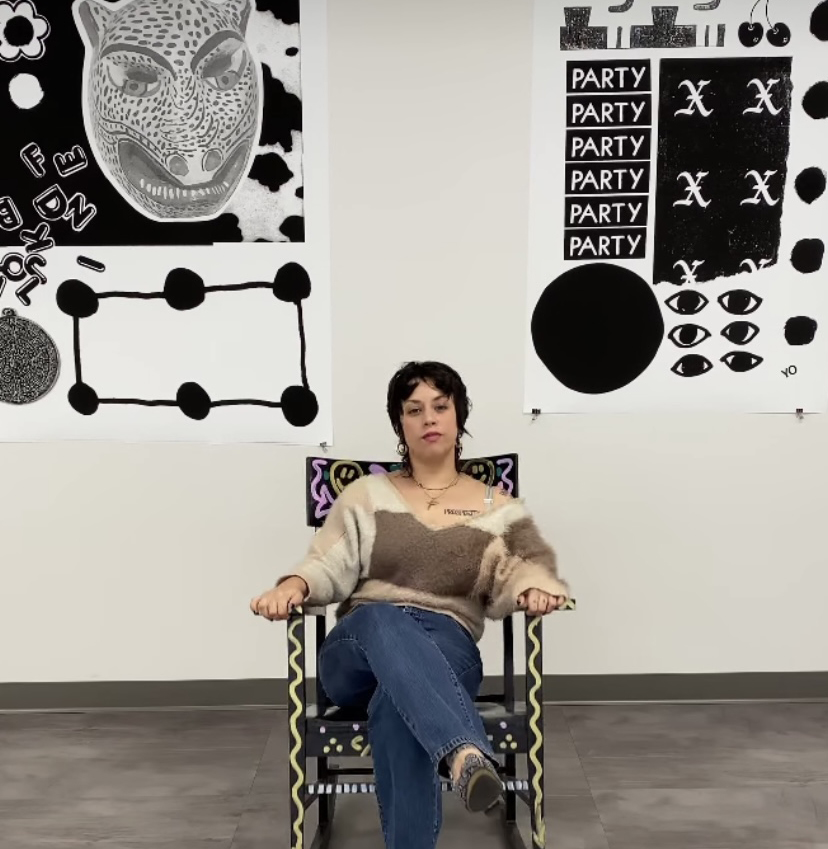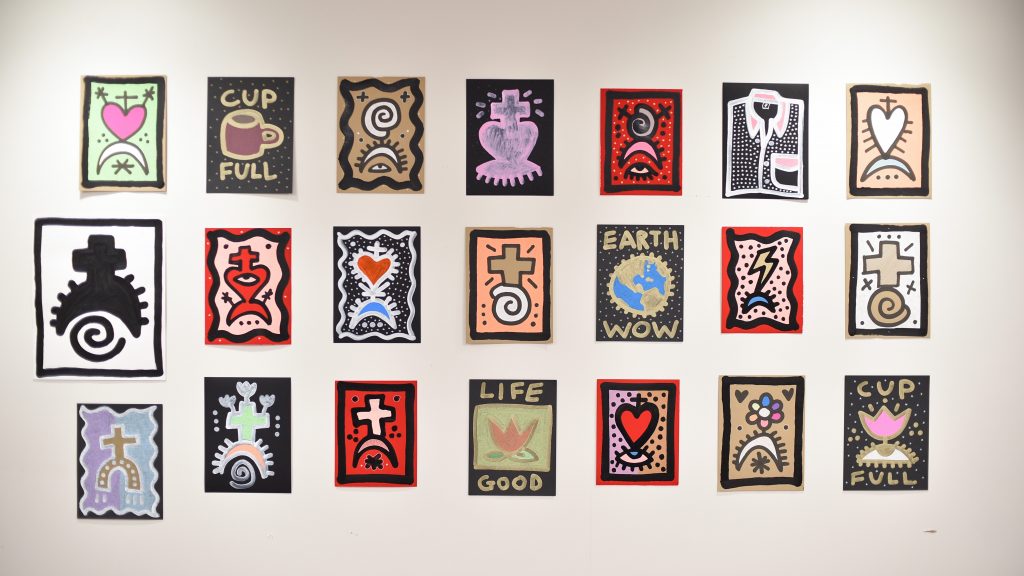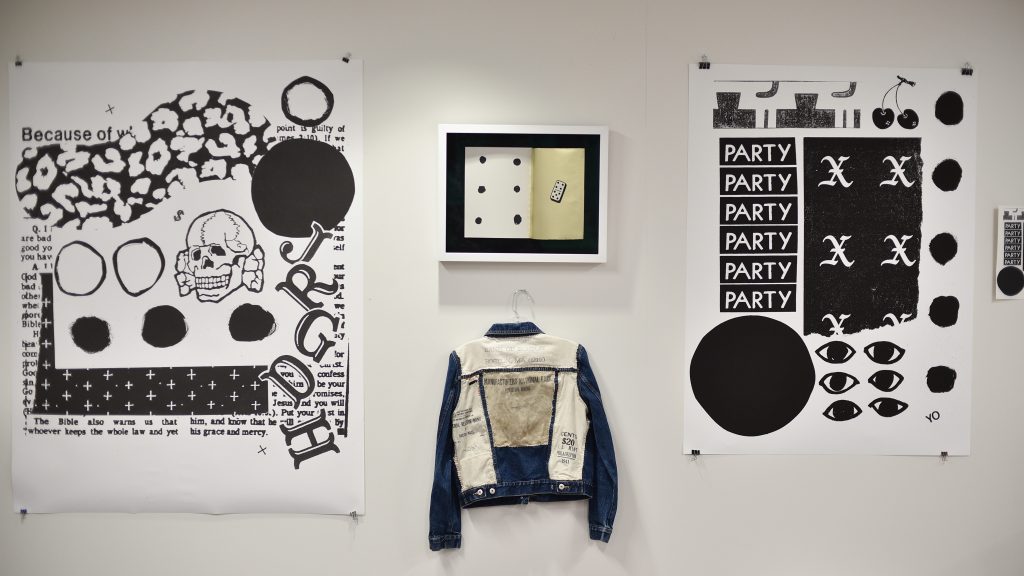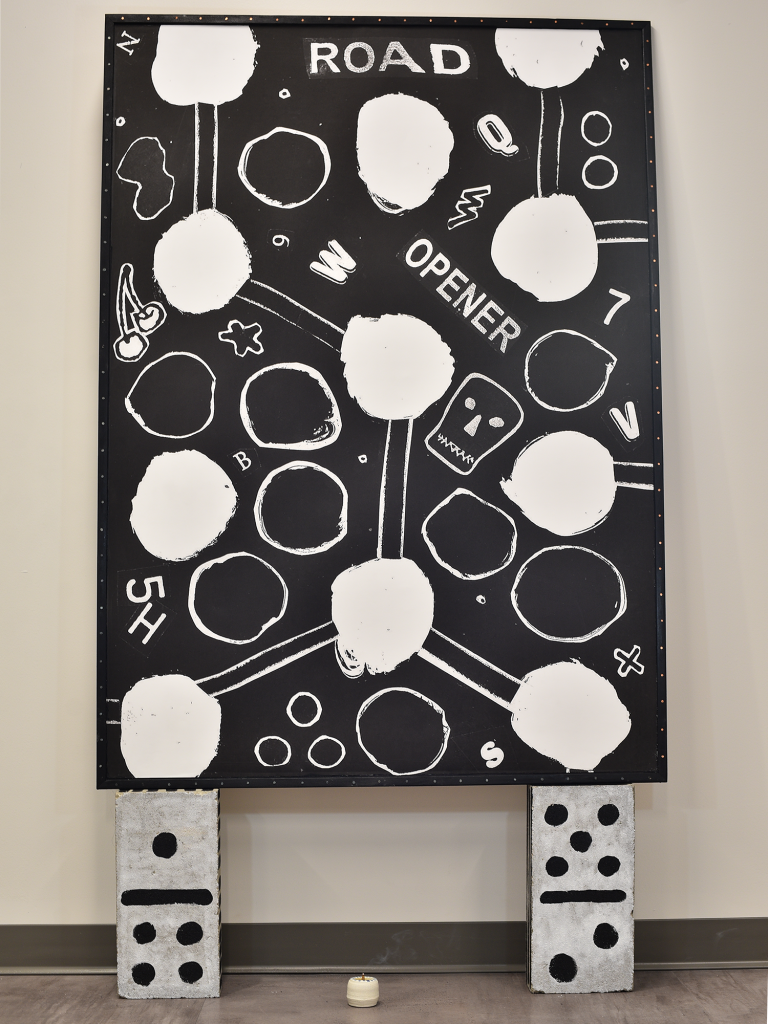While looking through the Shop Columbia website and its various artists, I found one whose style was right up my alley. Julia Arredondo is a Columbia College Chicago alumna, who graduated with her MFA in 2020. Previously, she had received her BFA at Maryland Institute College of Art.
Founder of Vice Versa Press and Curandera Press, she’s been featured in Union of Maine Visual Artists’ Maine Arts Journal and Colby Museum of Art’s The Lantern, and is currently in a residency with the Ellis-Beauregard Foundation in Maine. You can find her work and more information at juliaarredondo.com.
Julia was kind enough to take the time to be interviewed by me. Below, I transcribed the questions I had prepared for her and the answers she gave me during our Zoom interview, which took place on Monday, February 28, 2022, 1 PM CST.

Q1: When did you start working in your industry, and how did you go about it? (Did you have a plan on how you achieved/are going to achieve your goals, or do you just take the opportunities that present themselves to you?)
I’ve had the most chaotic trajectory so far. I started when I was in undergrad, my junior year. I also have family that’s in the printing business, in south Texas. So when I graduated undergrad, I went back home and worked in my family shop for a while. I also worked in a record store. Got paid minimum wage, but that was my first experience organizing events and designing show flyers, so that really helped me with my graphic design skills. I think I took just about every opportunity that came my way when I was first starting. It was good but it was also exhausting.
Q2: Where do you find the motivation or drive to work as hard as you do to be where you are today? (Did you experience a mindset shift, did the self-discipline come naturally?
I feel like the drive came purely out of survival, because I don’t come from a family of any means, really. So if I was going to be pursuing art, I had to find a way to pay myself, to be able to provide for myself, because no one else was. And honestly, I’ve always wanted to be rich! I wasn’t rich growing up, and I’ve always wanted to be valued in that way.
My mom is a workaholic, so I feel like I inherited that from her. I think that drive came naturally.
Q3: You have a lot of awards, exhibitions, residencies, and other accomplishments under your belt. How do you find these opportunities, and how do you complete so many of them?
I spend a lot of time researching opportunities. I go where the work is, so it’s necessary. And I’ve worked so many crappy jobs, been underpaid for so long, that now I’m trying to carve out my own career out of the opportunities that are available. So I really have to research.
I mostly find the opportunities online, but also in conversation with people. I listen actively, and even keep notes. So it’s a lot of word-of-mouth and a lot of online research. And how do I find the time? I’m single, I don’t have any kids. I work a ton, but I also have no obligations right now.
Q4: Is there anything you do consistently as an artist or entrepreneur that you take pride in? (Maybe related to a part of your identity or personal experiences?)
I take pride in all of the work that I do. I really value craftsmanship, so I make sure that all of the work that I make meets my standards of quality. I handmake all of it, so I want to make sure that it’s good quality. And I put that effort into everything that I do. Not only the things that I physically produce, but like my website – built that from the bottom up! It was such a pain! But I’m happy with it! It’s exactly what I want it to look like. When I think about my personal branding, I do everything, because it has to be a certain quality for me to be happy with it.

Q5: As an artist entrepreneur, do you lean more towards having a personal brand for yourself and directing it towards a specific audience/clientele, or doing what you feel like and seeing what happens? Or a mix of both?
That really fluctuates. I do a lot of starting up small brands, and then closing them up. My brands sort of come and go in waves. Right now, I’m focusing on my personal branding, because I want to focus on art for a while and making fine art, where I’m happiest. But it depends. I love starting small brands, so I’m sort of in the works of planning another one. Or just planning this next brand as me, and I think that’s a better way for me to go right now.
Q6: How did you go about exploring and learning to use different media? As a student, that kind of exploration seems overwhelming with the time, effort, costs, and travel they would take.
When I was a kid, I knew I wanted to make shirts and posters for rock bands, so I really focused on screen-printing early on, and then that just sort of opened up to different forms of production, printing, and merchandise manufacturing. It was hard, especially when I was a student, and I had such little money to use. I spent as little money as possible, and then I tried to make sure I could sell the products I made, and then re-invest into what I was trying to learn. I also reach out to people in my community if they’re doing a process that I want to learn.
Q7: What do you say is the best way to improve one’s skills? (Practice, experimentation and play, books and education, referencing and copying?)
For me, it’s definitely practice. There’s a little bit of play at the beginning, but then it’s practice. I think what helps me most is to develop my idea first. I do a lot of writing about my ideas ahead of time and then I sort of sketch them out. Then I’ll do a little play with the medium, and then I’ll get into production. When my work is successful, I found that it’s because I’ve sort of already planned the end result ahead of time.
Q8: How would you describe your personal artistic style? Is that your intention, or is that just how it ends up coming out?
My style changes a lot. I think I’m honing in on a style that is very much my own. It’s like a rebellious, spiritual, intuitive mark-making process. That’s how I think my fine art work is, and I think my writing and zine practice is very similar. Sort of immediate, renegade, but there’s a care? Carefree and careful! That’s a great question. I usually have others tell me what they see. Rarely the opportunity to really reflect on, what is my style?
Right now, I’m trying to follow my head more than my heart and I’m trying to make a new, cohesive body of work. When people recognize your style, they can follow your career easier.

Q9: Is there a project that you think catapulted your progress or career, or one that you think every artist should do/have in their portfolio?
In my portfolio, “Guide To Being Alone” really propelled my career in the zine and small publishing scene. I think that it’s important for artists to write about their work, to really just sit in some deep thought about what they’re doing. “Guide To Being Alone” wasn’t really about my artwork, it was about my life ethos. It allowed me to be flexible in my lifestyle.
I do feel like a website is important, for artists who are applying to grants, opportunities, or are trying to sell their work. All these institutions will ask for a website, and it legitimizes the artist in a way.
Q10: Where do you get inspiration from? (Music, movies, books, other artists, other arts, personal experiences?)
All of that. I’m reading three books right now; I’m always watching movies. Right now, I’m listening to tons of techno, and it’s influenced my work in a huge way. I wish I could describe this experience of being an artist, but I’m just constantly being bombarded by ideas, because I’m inspired by everything. By materials that I find on the ground, by images on Instagram, by Twitter posts. I wish I could put it simply.
Q11: What are some words of wisdom that you’ve realized – whether in the industry or in life – that you just really want to share with the world?
Friend groups! I want to address friend groups and peers, because I think they really have the power to propel a career, and to stifle a career. There are a lot of connections I’ve made that I sometimes wish I hadn’t, so I think being really choosy with the people that one shares time and energy with is really important. That’s a lesson I’m still learning. It’s important to make sure values are similar in friend groups. And I think personal boundaries are really important when it comes to a professional career and one’s time. I think it’s important to establish them early on.
Q12: Since you’re being interviewed, is there a question you were hoping to be asked that you would like to answer?
I like being super transparent about economic background, so I like talking about how I was able to afford to be here. I always get scoffed at, and I’m like, “I worked three jobs and I sleep four hours.” So I like being really transparent about that. It’s not been an easy journey by any means, but it’s been a lot of fun. It’s been a lot of work, and sometimes it requires three part-time jobs. Sometimes it requires several nights of writing to get that $10,000 grant, which is totally obtainable. There are so many ways to have a creative career.

For more information about Julia, visit juliaarredondo.com